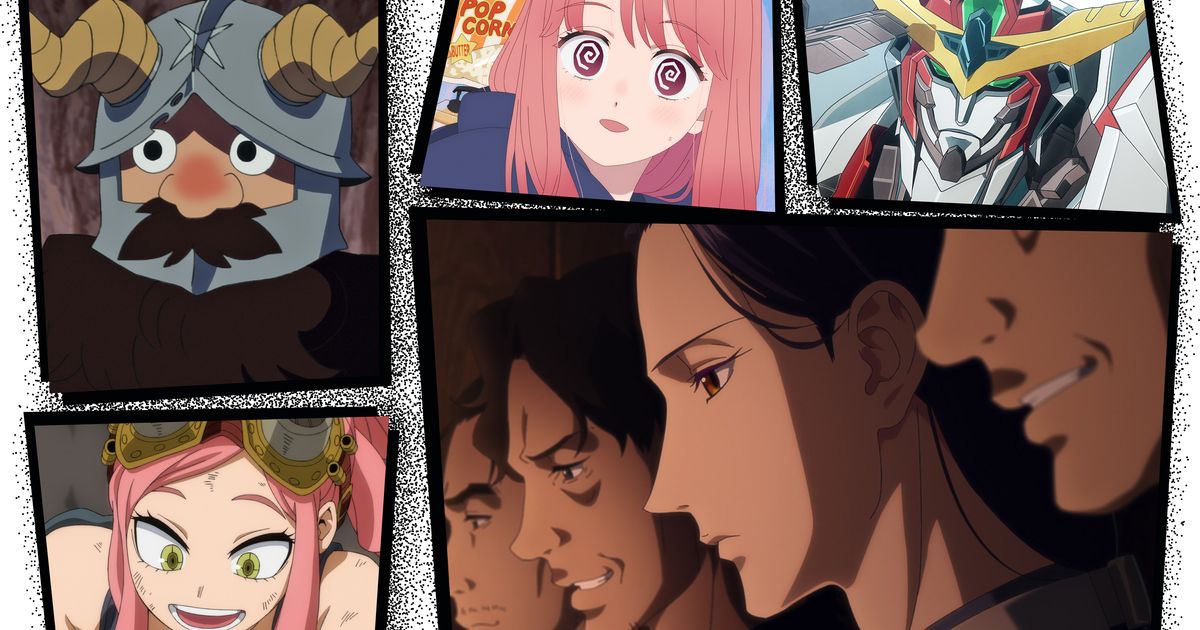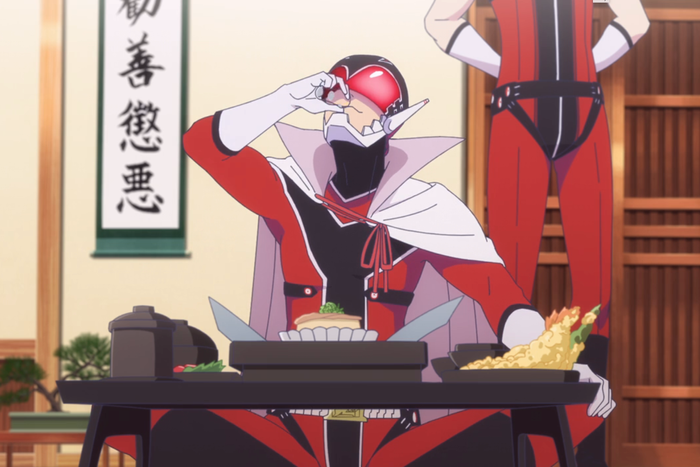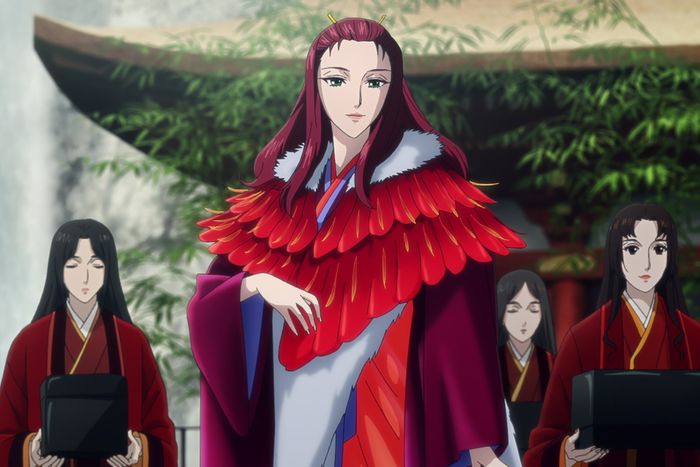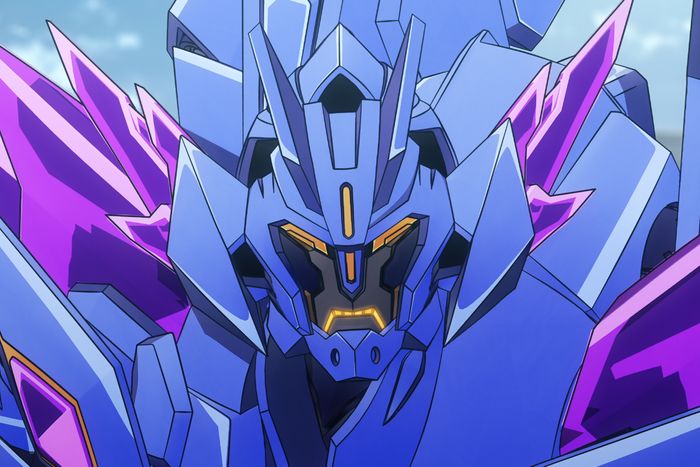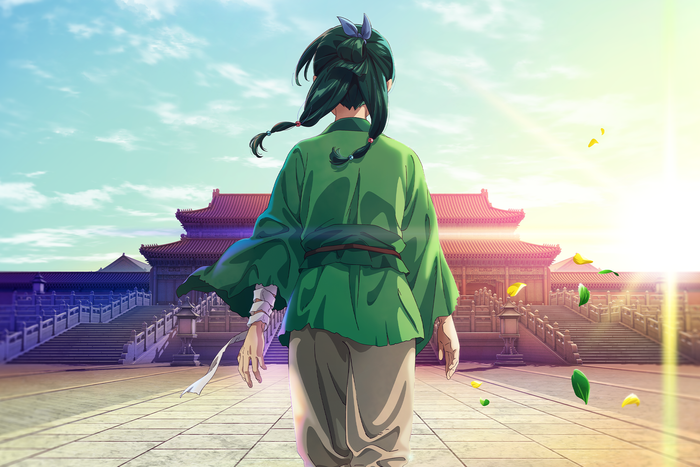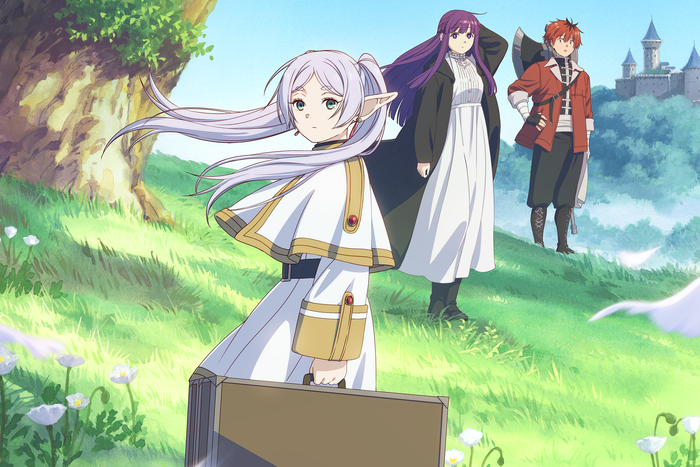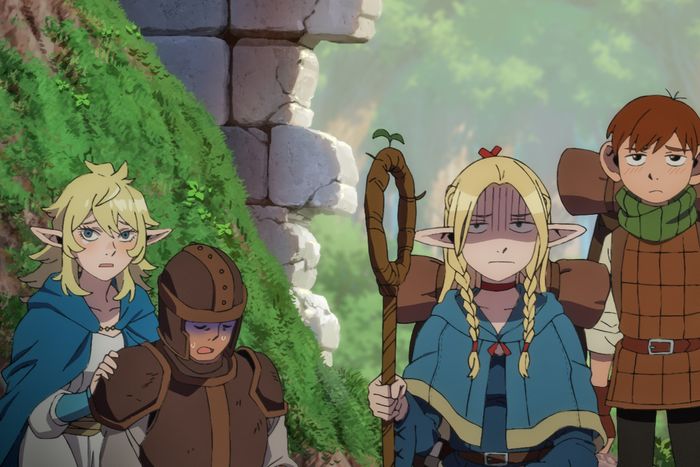Photo: K. Horikoshi/Shueisha, My Hero Academia Project
The blockbuster superhero anime approaches its endgame in its seventh season by adapting Kohei Horikoshi’s manga. The world of My Hero Academia echoes that of the X-Men, except people born with powers are the majority rather than the minority. Main character Izuku “Deku” Midoriya was one of the few born without a special ability, until the fateful day he met his hero, who chose him as his successor and gave him his power, named One for All — a combination of the abilities of its previous eight users, Avatar style, including super-strength, flight, and the ability to sense incoming danger.
In between its moments of spectacle and shonen grandstanding, My Hero Academia pays close attention to the sociology of a world inundated by fantastic powers. Super-heroism has become the norm — for some, it’s the family business — and such entrenched hereditary power has led to its own problems, with the previous generation having made numerous moral compromises to maintain the peaceful status quo. Those chickens have finally come home to roost, with the skirmishes between Deku and the League of Villains spiraling into all-out war, even reaching foreign shores. That’s right, the USA finally gets involved with a hero named (what else?) Star and Stripe wielding the power to impose rules over anything she observes. Winking, blunt-force allegories for imperialism aside, it’s exciting to see the show swing for the fences in its big final arc.
Photo: Hulu
Based on the manga by Negi Haruba, Go! Go! Loser Ranger inhabits the point of view of an anonymous henchman as he seeks to take down the dominant and corpo-fascist Super Sentai–esque heroes from the inside. Every Sunday for 13 years, the heroic Dragon Rangers have fought invading alien monsters from a floating fortress — only the Rangers won long ago, and these battles are essentially predetermined for live television, with the monsters forced to maintain kayfabe under pain of death. The battles staged are effectively Saturday-morning children’s programming as propaganda. During one of these battles, Fighter D slips away and assumes human form in order to infiltrate the organization of his oppressors. It’s not so much a fight for justice as it is a spectacle for ratings — the Rangers, here a vast military operation, keeping up a facade for their adoring fans where the monsters see them for what they are: vain sadists. D’s mission to beat the Rangers picks up some unlikely companions, but whether they’re on his side or not, everyone in Loser Ranger is completely, compellingly unhinged.
Photo: Chisato Abe/Bungeishunju/NHK,NEP,Pierrot
Yatagarasu begins like a fable: A boy and his ailing brother are rescued by a man who can turn into a giant golden raven, only for the boy to forget it ever happened though they’re fated to meet again. But this is also the beginning of the series’ various tonal and narrative twists, as it quickly turns from that idyllic setting to a cold war for succession set within the gilded cage of a royal palace.
The series is set in Yamauchi, a country split into four houses with a mountain palace unifying them in the middle. Ruling over it is a hereditary monarchy, the descendants of Yatagarasu, mystical three-legged ravens (named for the Shinto god) that could turn into humans, ones that built the lands their descendants now squabble over. The monarch is always the k’inu, a golden raven. Everyone else jostles for whatever power they can grab. This struggle is observed from two perspectives: Lady Asebi, a consort sent by her family to the palace to compete for the prince’s hand in marriage, and Yukiya, the second son of landed gentry who now serves as the prince’s aide (while the prince’s own family attempts to usurp his position as ruler).
Yatagarasu patiently and deliberately creates a compelling court drama in which the ritual, ceremony, and propriety are covers for the same ugly human impulses that are anywhere else. It’s quietly one of the most interesting shows of the season.
Photo: Brave Bang Bravern! Partners
Three words: gay giant robot. From industry legend Masami Obari comes Brave Bang Bravern!, which not only has a flashy super-robot invading the military-flavored setup of a “real robot” anime, but also has that same super-robot be in love with his pilot. The boisterous sentient alien mech Bravern comes crashing into the lives of mech pilots Isami and Lewis Smith, quickly forming an attachment to the reluctant Isami, leading to a man-on-robot romance for the ages.
Bravern stands out for its knowing but earnest absurdity, showing immense dedication to the conventions of the robot’s genre. To everyone’s bemusement, Bravern insists on yelling all of his attack moves while hilarious cutaways reveal that he plays his own theme music and projects his own logo behind him when he transforms. The show gets a lot of mileage out of its quirky giant robot that’s also a giant robot otaku, passing time by building model kits in the basement and thinking of something cool to do in his next fight.
Even if you’re unfamiliar with the sorts of shows Obari is parodying here, it’s hilarious to see Bravern guiding the reluctant, taciturn Isami through the etiquette of being a super-robot pilot. It also boasts one of the most spectacular end-credit sequences of the year, which really should be seen rather than described. So crack open that ice cold Kona Big Wave and enjoy one of the year’s funniest and finest shows.
Photo: Hyuganatsu, Imagica Infos/“The Apothecary Diaries”Project
In its second part, The Apothecary Diaries continues to unspool smart mysteries, following various medical cases through the eyes of the young apothecary MaoMao. The series takes the joys of a procedural and supplants them into a faux-feudal Chinese pavilion, its smart and funny main character working as a poison taster and then lady-in-waiting in a palace annex reserved for the emperor’s concubines.
The analytical detachment of the medical enigmas in the first part of The Apothecary Diaries take a turn for the more personal in this year’s episodes, as MaoMao’s familial ties to the palace are gradually revealed. It’s through the complications of those relationships — or lack thereof — that a new, overarching mystery is built. But, beyond the larger story, it’s consistently satisfying to see MaoMao’s process and intuition at work and the observations that she makes, not just on a functional and pragmatic level but on a personal one, too. While her emotional intelligence may not extend to her colleague, Jinshi, it serves her well with the concubines, a touch of empathy for women who are treated as trophies for the wealthy, locked away in gilded cages.
Photo: suu Morishita, KODANSHA/”A Sign of Affection” Production Committee
A syrupy sweet romance about communication, A Sign of Affection follows the tentative courtship between university students Yuki and Itsuomi. Yuki is deaf, so along the way she teaches Itsuomi, a keen linguistic scholar, how to speak Japanese Sign Language.
Beyond the sweet crush between its principal characters, A Sign of Affection rounds out its cast with a range of angsty and beautifully drawn 20-somethings with varying chips on their shoulders and romantic anxieties. (Seriously, these are some of the most beautiful people ever drawn.) Tried-and-tested shojo clichés — the spurned childhood friend, for example — are here, but they maintain dramatic weight and a sense of emotional complexity. There are some moments where its day-to-day drama becomes unintentionally funny, like Yuki looking completely awestruck at a Costco (to be fair, they’re university students, and anyone would be thrilled by the store’s gigantic tiramisu). Otherwise, the show has a cute sense of humor and an almost sickly romantic temperance, perhaps an acquired taste for some. But for those who do appreciate such unabashedly sentimental anime, A Sign of Affection will go down smooth.
Photo: Kanehito Yamada, Tsukasa Abe/Shogakukan/“Frieren” Project
Much like the title elf herself, Frieren: Beyond Journey’s End stays as spritely as ever throughout a rather long (28 episodes!) but captivating season. Here, in its second part, Frieren must take a mage exam. It turns out that Frieren, in her centuries-old age, doesn’t have any kind of government-supplied proof of her aptitude for magic. Frieren and her longtime protégé, Fern, sign up for the test and meet a host of colorful new characters.
In its first part, Frieren was one of the most beautifully made anime series of last year, and it continues to be in its second. Beyond outstanding visual presentation under the eye of series director Keiichirō Saitō (Bocchi the Rock!), with its gorgeous backgrounds and articulate character animation, Frieren also shines through Evan Call’s work on the soundtrack, which evokes classic high fantasy with sounds that feel ripped from the past: fitting for a show about a bookworm who is over 1,000 years old.
If you’ve been watching up to this point, then you know about the show’s favoring of quiet character work only to surprise you with a kinetic, smartly choreographed action spectacle. The new arc leans into this excitement with a renewed focus on mage combat that unfolds like hypermobile battleships moving against each other, spells unleashed with sudden explosive power. Watching these psychos size one another up is fun, yet even with a higher concentration of battles than in its first half, the show never completely gives over to pure spectacle as it keeps delving into both Frieren’s extensive past and adding new complications to her world.
Photo: Netflix
This adaptation of the excellent Ryoko Kai manga from Studio Trigger (Cyberpunk Edgerunners) and director Yoshihiro Miyajima quite literally makes a meal out of the logistics of tabletop fantasy RPGs, with its main cast learning how to cook monsters in order to survive a trip down to the lowest depths of an incomprehensibly large dungeon. After a disastrous encounter with a dragon that results in his sister being eaten alive, the human Laios, the elven mage Marcille, and the halfling Chilchuck venture back into the dungeon to rescue their comrade with the assistance of the dwarven cook and forager Senshi.
What follows is part traditional fantasy adventure, part cooking anime as each episode — titled after whatever meal they’re having — follows the gang through the unique environment of each new level of the dungeon. The show’s second half in particular has only gotten more compelling, progressing from relatively low-stakes, lighthearted culinary antics to rather tragic and frequently dark drama colored by expansive world-building.
Each episodic story deftly balances action, comedy, and horror, as well as a sense of genuine wonder in the exploration of each layer of the dungeon. It’s the same appeal as Kui’s manga, in which every chapter is artful and funny and brings something new and exciting. The voice performances are great in both Japanese and English casts, too — anime fans can be choosy about dubs, but it’s worth highlighting the quality of the one for Delicious in Dungeon, which boasts some of the most deranged, laugh-out-loud line reads of this year in television so far.




